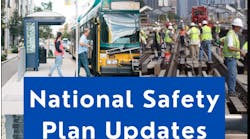Transit agencies and commuters across the country will be keeping a close eye on Congress this year, as lawmakers begin negotiations to authorize a new surface transportation bill to replace MAP-21 after its expiration in September.
Public transit is indispensible to riders, local communities and the greater American economy, but our transportation agencies and riders are feeling the squeeze of an enormous infrastructure deficit. Decreased federal funding has put our bus and rail infrastructure at risk and just at the start of this year millions of everyday workers saw their transit benefits cut in half because Congress failed to preserve transit parity.
It’s critical that we replace MAP-21 with a long-term, sustainable authorization bill in order to effectively address our current infrastructure backlog. Congress needs to avoid short-term, stop-gap funding measures that only paper over the problems and put our riders at risk. Instead, we should seize the opportunity to make significant improvements in public safety and transit reliability for commuters, all while boosting economic growth and employment all across the country. As stated by President Obama in his State of the Union speech in January – it’s critical that we recognize the positive link between infrastructure investment and job growth. By continuing to fund transit, we can help get Americans to work.
Now all eyes have turned to Washington as members of Congress work together to pick through the dozens of infrastructure funding options presented from both sides of the aisle. Recent budget compromises and the bipartisan nature of this issue makes us optimistic that Congress will work together to fund our nation’s vital transit priorities, but we should keep in mind that a solution should be found sooner rather than later. It is critical that our lawmakers move quickly to negotiate long-term funding that gets our riders to work safely and efficiently.
The Getting America to Work coalition represents over 80 transit agencies that advocate for vital investments in America’s infrastructure. Together, these agencies get millions of Americans to and from work safely and reliably. Our coalition will be keeping track of the movement of transit legislation as we approach the September budget deadline. We will be paying close attention to Chairman Shuster’s discussions with Chairman Camp, as they try work to find a mechanism to pay for the next transportation bill.
We are confident that Congress will find a replacement for MAP-21 that works for taxpayers and transit agencies, and addresses our infrastructure deficit in a sustainable way. We are heartened by the serious discussions of this issue taking place in Washington, as indicated by some suggesting using general funds or increasing the gas tax to pay for an extension. It’s ideas like these that indicate Congress understands the stark reality facing our transit infrastructure, and the urgency of the need to move quickly to fund the next surface transportation bill.
American public transit not only gives Americans an efficient and economical way to get to work, but it also creates jobs and builds local economies. Every $1 billion invested in public transportation supports nearly 24,000 jobs. Especially at time when many are still looking for work, these are real employment impacts that we simply cannot afford to lose. Millions of Americans rely on public transit in their everyday lives and find it essential for getting to work. Those families and individuals should not be made to suffer needlessly with failing infrastructure and painful cuts to their commuter benefits. It’s time we take care of our taxpayers, our workers, our communities, and the basic infrastructure they depend on.
Leanne Redden is senior deputy executive director of planning with the Regional Transportation Authority in Chicago. She's an advisory board member for Getting America to Work and will take over as acting executive director of the RTA on March 1.



